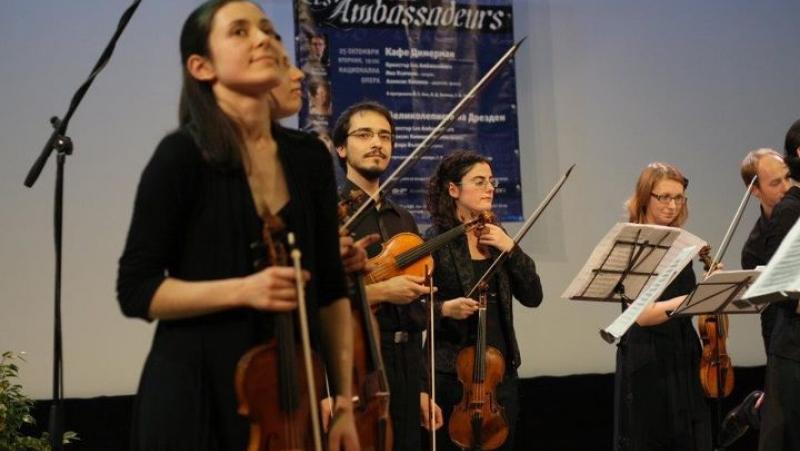Article by Yuliana Alexieva about the Fifth Edition of the Baroque Festival in “LIC” magazine, issue 12, December 2011.
A singing guitar? It turns out that this is also possible. And that it is an old practice that actually existed in house concerts in long ago times. Back when people were interested in what Rossini’s new opera sounded like, say. And the distances between the cities were overcome slowly, there were neither CDs nor DVDs. And then the guitar came to the rescue – the most affordable and the most popular. A skillful arrangement is made and the general public manages to get a general idea of how the new creation sounds. Because people really cared and cared about keeping up with their musical times. I’m telling you all this because the first concert of the “Art of the Baroque” festival in Sofia /October 22 – November 29/ gave us the plot. The opera presented in this form was Semiramis by Rossini, the arrangement by his contemporary Mauro Giuliani. The virtuoso guitarist who was up to such a strange and extremely difficult task was a Dutchman, Izhar Elias. It was he who recorded the complete version of the opera, very long /on 2 discs/ – the first and only recording in the world. Elias offered us a shorter version, including the participation of an actor who presented the content of the opera during the action. All in all, a curious and enjoyable glimpse into the past. Nice because it was really masterfully defended by the Dutch musician. And he, although young, already has a respectable biography, this year he received the most significant one Dutch Music Award. I highlight it because it testifies to the performance level of those invited to participate in this festival. Even while looking at the program, one understands that there are no compromise breakthroughs: although young, the performers already have serious practice and authority. And in every concert there is a very appetizing lure for connoisseurs.
The credit for all this goes to Zefira Valova. The name began to be heard in our country after the first baroque festival organized by her. It was 5 years ago, it passed successfully, then it kept happening. Now it’s the fifth. For those who still don’t know who she is, I hasten to clarify that she is a very good violinist, has played and plays with the most famous musicians in Europe, a passionate advocate of early music. And it turns out to be a personnel organizer. One should not hope for her – beautiful, fragile in appearance, where does this iron in her character come from, which helps her gather around her always first-class performers? And to carry out his intentions. And to find the right sponsors to put the complex puzzle of the program in order. And to diversify the atmosphere, moving the concerts through different halls, each of them giving its own flavor to the respective event… First we were in the hall of the Sofia University, then in the Opera /for the first time/, then concerts in the Military Club and in the NDK , and in the Academy of Music. Another proof that an ambitious event can be achieved when a talented person stands behind it – with the persuasiveness of his talent, his taste, and last but not least, his connections. The program of the fifth baroque festival also includes musicians who have already been here, i.e. a sort of friendship circle is emerging. And there’s nothing wrong with that. On the contrary, when these musicians are at such a high level – they are welcome.
The opening concert was entitled “Night at the Opera”, the interesting highlight of the program was not limited to Semiramis. In the second part of the program, the guitar was joined by Zefira Valova /violin/, as well as a magnificent, very young cellist who has already come to our country: Tomasz Pokshiwinski plays in the most famous Polish ensemble for early music. They performed works by two almost completely forgotten authors. Both soldiers, both involved in the French Revolution, both zealously linked to the guitar: François de Fossa and Antoine Loye. Today’s legion of performers – curious and seeking to diversify our musical knowledge – are reviving their music, and these are very recent discoveries. Here, we were treated to such rarities from the very first evening in “The Art of the Baroque”. A festival in which baroque is located in the widest space, without delineated borders and in diverse variants, with a view backward and more often forward in time.
The next festival concert was at the Opera House. Visiting orchestra The ambassadors /The Ambassadors/. Multinational European composition, conducted by flutist Alexis Kosenko /France/. Already in the first minutes, a detail makes a very strong impression, to which I don’t know how many pay attention. But in my opinion, it is very interesting and revealing: how the composition is adjusted. Prolonged, carefully, with tender care. Professionals know that old instruments are more capricious in terms of tuning, performers need to listen to their own sound as well as the collaborative one. Tuning sounds like some strange explanation in love: of musicians to their instruments, of musicians to each other. A magnificent ritual of harmony and agreement between sound and soul, from which music is born. These young people do not demonstrate a routine /although they have accumulated it/, they do not impose self-serving virtuosity on us. They play with ease and freedom, as if they were playing their own music, not someone else’s and something from the past. The pace is faster, as it is today, but with a natural ease. And it is as if precisely this unobtrusiveness, the desire to lead you flatteringly, creates the wonderful feeling of inclusion. You don’t resist – you feel good with both Telemann and J.S. Bach. The soprano Ina Kancheva brought a slight dissonance. There is still a lot to learn – at least in the realm of baroque music. First of all, perhaps, the attitude towards the text, which plays an extremely important role in this music. As well as the feeling of inner intensity. The transformation of recitatives and finally vocal roulades into meaningful and richly colored musical speech is one of the most difficult tasks for performers of early music. We can also find this particular rhetoric in instrumental music. Zefira Valova is brilliant in this regard. The recital with Vasiliy Ilisavski /hammer clavier and harpsichord/, named A prayer in gallant style, demonstrates a magnificent knowledge of style, warmed by a captivating emotionality. The baroque pathos of Tartini alongside the exquisite theatricality of Mozart. Zefira takes us through the transition between these two eras with captivating immediacy, Ilisavski is more restrained and even slightly distant, but this very difference seems to give a special tone to their ensemble. His partnership with another brilliant instrumentalist, a guest of the festival, the American double bassist Brett Simner, who also had a master class at the Academy of Music, was similar. A virtuoso thanks to whom we met the Viennese double bass. It turned out that there was a period in which he was particularly sought after and they created a bunch of concerts for him. We heard two of them, marveling at the unexpected mobile elegance of the sailing instrument. In general, this baroque festival extremely generously offered us unknown authors, plays, instruments, as well as a view of the past freed from prejudices and schemes. Where, along with the geniuses, good musicians also proudly lived, ensuring a respectably high general level of tonal culture. Particularly interesting in this regard was the appearance of an extremely curious formation called the Balkan Baroque Band. Again a Frenchman is at the core, Jean-Christophe Frisch. Gathered musicians from the Balkan region and together they try to achieve musical agreement, performing old music. They already sound great in Luly. The most popular one needs more time to ring more convincingly. But the truly innovative thing with which this formation surprises is the unearthing of “exotic” and completely unknown authors today, such as Amando Ivancic /1727-1790/ or Mordecai Rosenthal /1789-1848/, whose compositions they included in their program. The Balkan region perhaps hides a number of sound surprises that deserve to be discovered and publicized. As for this motley ensemble – it, like Barenboim’s Palestinian-Israeli orchestra, proves that music helps people live in peace and harmony. However, I was surprised by the fact that there was no Bulgarian in the lineup this time…
#Surprises #delights #View #Info


